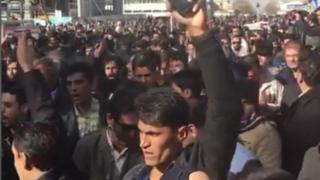Iran hit by second day of anti-government protests
Anti-government demonstrators have taken to the streets of Iran for a second day, with protests being held in a number of cities.
The protesters have been angered by rising prices and corruption.
Large numbers have reportedly gathered in the western city of Kermanshah, with a smaller demonstration in the southern city of Shiraz.
The biggest protest on Thursday was in the north-eastern city of Mashhad, where there were 52 arrests.
There have been calls on social media for protests up and down the country, despite warnings from the government against illegal gatherings.
The governor-general of the capital, Tehran, said no permits had been issued for public demonstrations.
He said such gatherings would be firmly dealt with by the police, who are out in force on main intersections.
- Hassan Rouhani, the president who moved left
- Iranians urge Rouhani not to disappoint
Videos posted on social media purport to show clashes between security forces and some demonstrators in Kermanshah on Friday.
'Harsh slogans'
A number of cities in north-eastern Iran held protests on Thursday. They started with anger at the inability of the government of President Hassan Rouhani to control prices – the cost of eggs has doubled in a week.
However, some developed into broader anti-government protests, calling for the release of political prisoners and an end to police beatings.
There were also chants in Mashhad of "not Gaza, not Lebanon, my life for Iran", a reference to what protesters say is the administration's focus on foreign policy rather than domestic issues.
The arrests in Mashhad were for chanting "harsh slogans", officials said.
'Seething discontent'
Analysis by Kasra Naji, BBC Persian
The demonstrations have taken the Iranian authorities by surprise. Impromptu anti-government demonstrations are rare in a country where the Revolutionary Guard and numerous intelligence agencies have a strong grip on the population.
Predictably they are blaming anti-revolutionary elements and foreign agents. But the protests clearly stem from seething discontent in Iran, mainly because of the worsening economic conditions faced by ordinary Iranians.
A BBC Persian investigation has found that Iranians, on average, have become 30% poorer in the past ten years alone.
Many believe Iranian leaders are spending money that should be used to improve their lot on war efforts abroad. Billions are also being spent on spreading religious propaganda and Shia Islam around the world.
But it seems that the hardliners opposed to President Rouhani may have triggered the unrest by holding a demonstration that quickly grew out of control and spread to cities and towns across the country.
The head of Mashhad's revolutionary court, Hossein Heidari, said: "We consider protest to be the people's right but if some people want to abuse these emotions and ride this wave, we won't wait and will confront them."
President Rouhani promised that the deal he signed with world powers in 2015, which saw Iran limit its nuclear activities in return for the lifting of international sanctions, would boost economic growth.
The economy has risen out of recession and inflation has been reduced, but businesses are still struggling from a lack of investment and the official unemployment rate is 12.4%.

